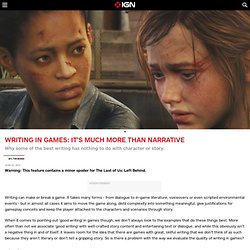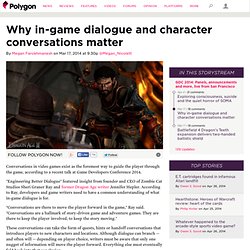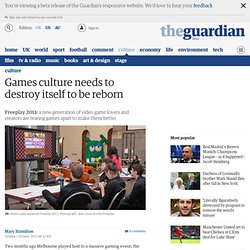

Spiller seg til bedre engelsk. Slem i dataspill, snillere i livet? Writing in Games: It’s Much More Than Narrative. Warning: This feature contains a minor spoiler for The Last of Us: Left Behind.

Writing can make or break a game. It takes many forms - from dialogue to in-game literature, voiceovers or even scripted environmental events - but in almost all cases it aims to move the game along, distil complexity into something meaningful, give justifications for gameplay conceits and keep the player attached to the characters and scenarios through story.
Can Video Games Be A Spiritual Experience? Ludic Learning – Play to Learn and Learn to Play. Balancing Gameplay and Narrative « Nintendojo. I finally got around to giving Spec Ops: The Line a play a few weeks ago.

A third-person military shooter, Spec Ops was met with mostly positive reviews from critics when it launched a couple years ago, but wasn’t particularly embraced by players. Despite garnering average scores, I still found myself interested in playing the game because the development team was very outspoken about their vision for it. Spec Ops wasn’t supposed to be just a mindless run and gun war game like so many other titles on the market. Instead, players were intended to spend time contemplating the consequences of their actions during the course of the campaign.
Guilt was a particularly recurring theme of Spec Ops, making players question whether the life or death choices they made were worth the cost. Playing through the campaign, I have to admit that Spec Ops fell short of its lofty aspirations, for me. Gaming is Good for You (Infographic) My kids can’t seem to get enough of their video games.

I can take away the Xbox 360’s power cord or tell the kids to go outside and play, but at the end of the day, they simply want to keep on playing. Fortunately, more and more research is coming out that distinguishes healthy, responsible gaming from the excessive, zoned out variety. Our latest infographic goes over some really great things video games are responsible for. Why in-game dialogue and character conversations matter. Conversations in video games exist as the foremost way to guide the player through the game, according to a recent talk at Game Developers Conference 2014.

"Engineering Better Dialogue" featured insight from founder and CEO of Zombie Cat Studios Sheri Graner Ray and former Dragon Age writer Jennifer Hepler. According to Ray, developers and game writers need to have a common understanding of what in-game dialogue is for. "Conversations are there to move the player forward in the game," Ray said. "Conversations are a hallmark of story-driven game and adventure games. Nesttunhalsen 20 A. The 100 Best Free PC Games.
Looking for the best free PC game?

Why Video Games Are Important. Mye dataspill må ikke føre til problemer. Hey Snobs, Stop Hating On Video Games. A screenshot from Journey I couldn’t watch Charlie Brooker’s How Videogames Changed the World when it was initially broadcast in late November.

But I did have one eye on Twitter, following the reaction to this listicle-styled smorgasbord of gaming landmarks. Reading and Hypothesis. I see more and more games with no story, only “backstory”.

The game consists of piecing together what has gone before, and possibly performing a few anticlimactic actions to round it all off. Reviewers even speak of “the backstory” as if it’s the most important aspect of any game, right up there with mazes and hunger puzzles. Digitalisering af børns leg. Post-narratology: A case for object-oriented narrative game studies. I recently wrote a chapter for the forthcoming Routledge Companion to Video Game Studies(1), sexily titled “Narratology”.

Writing this piece gave me a chance to reflect on the work being done on narrative and narration in game studies, which happens to fall across two camps following the narrative/narration divide. Following film narratologist André Gaudreault’s two strands of narratology(2), there is a narratology of contents, dedicated to the study of stories, characters, themes or plot devices, rather independently of their telling (narratives as objects), and a narratology of expression, concerned with the expressive properties of different media and their intrinsic narrative potential (narration as a process). 3am thinkings. I was told that Amnesia was an excellent and extremely frightening game.

I vaguely wondered what could ever be good about a game being scary. This vague curiosity became more pressing when I started to experience first hand just how frightening it was. I gave Amnesia a try with my mind as open as possible. I decided to play it with headphones on, the lights off and exclusively at night time. I played it fullscreen, with the in-game audio on nice and loud. I would not try to trip the game up or mess it around. Spillvev. Games culture needs to destroy itself to be reborn. Two months ago Melbourne played host to a massive gaming event, the first Penny Arcade Expo to be held outside the US.

PAX Australia, a consumer show billed as an inclusive event for all gamers, was a hugely successful, mainstream event. Hvordan fremstilles egentlig dataspill i læringssammenheng i avisene? Serious Games And The Future Of Education. What’s wrong with the Ludic Century? As a follow up to my Manifesto for a Ludic Century, journalist Heather Chaplin posted an article on Kotaku that included many great reactions to the piece, from Frank Lantz’s poetic game narrative to Ian Bogost’s cutting criticism, and other wonderful responses from Leigh Alexander, Robin Hunike, and Tracy Fullerton. The article is also getting responses across the web, both laudatory and critical. (Of course the critical reactions are the ones that excite me the most.) Perhaps the most detailed answer comes from the sweet and brilliant David Kanaga, a game developer known for his work on Proteus and Dyad.
The Last of Us. Medievold. A Sea of Endless Bullets: Spec Ops, No Russian and Interactive Atrocity - Front Page - Magical Wasteland. Throughout the history of war-themed shooting video games, game designers have often thought about how they might use the tools at their disposal to explore a new dimension of commentary on their subject matter even as they also succeeded in creating best-selling entertainment. Yager’s Spec Ops: The Line is a recent example; Midway’s Blacksite: Area 51 and Free Radical Design’s Haze come to mind as earlier ones. I have sat in such meetings, too, where creative leads became excited for how they would somehow attain a deeper level of unvarnished truth than previous war-themed games were able to achieve. Tom Bissell reviews Spec Ops: The Line and explores the reasons why we play shooter games.
In early June, at the E3 convention in Los Angeles, I attended a demo for a game called Splinter Cell: Blacklist. In the demo, I watched the Splinter Cell franchise’s long-established hero, Sam Fisher — operating somewhere in Middle Eastistan — enter a tent, kill two gentlemen, and grab a third. Sam asks this third gentleman where a certain colleague of his might be. The gentleman declines to answer, so Sam sticks his knife into the gentleman’s clavicle.
Spill som litteratur. Er dataspilling en sykdom?